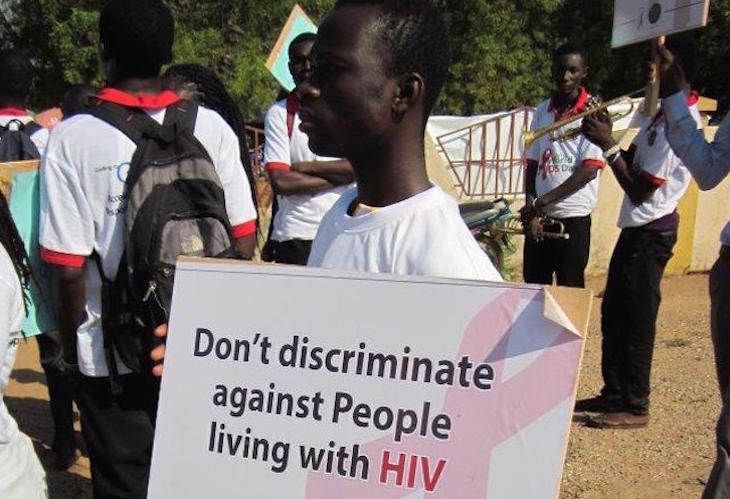The Health Policy Project ended in 2016. Work continued under Health Policy Plus (HP+) until 2022.
NEWS & VIEWS

Health Policy Project
One year of experience with an online reporting system
January 8, 2015
Authors: Taylor Williamson, Health Governance Specialist, Health Policy Project/RTI International; Vivian Fiscian, Consultant, Health Policy Project; Joseph Whittal, Deputy Commissioner, Human Rights, Commission on Human Rights and Administrative Justice, Ghana; Ron MacInnis, Deputy Director for HIV, Health Policy Project/Futures Group
Discrimination against people living with HIV and key populations is a common and challenging problem. A year ago, the Commission on Human Rights and Administrative Justice (CHRAJ) in Ghana launched a web-based system to provide a simple way for reporting HIV- and key population–related discrimination.
The discrimination reporting system is the product of a partnership among CHRAJ, the Ghana AIDS Commission, and governmental and nongovernmental stakeholders, with support from the U.S. President’s Emergency Plan for AIDS Relief (PEPFAR) and the U.S. Agency for International Development (USAID) through the Health Policy Project.
How is the system performing?
We measure system performance by identifying:
1) How many cases have people reported to CHRAJ?
2) How quickly are cases satisfactorily addressed?
One year after the launch, 21 cases of discrimination have been reported to CHRAJ through the system, though CHRAJ is aware of at least 32 cases through discussions with Civil Society Organizations (CSOs). Of these, three have been resolved, either through direct follow-up or referral to the police, and eight are under investigation by CHRAJ. CSOs are investigating the remaining 10 cases, which were reported to CHRAJ for data collection purposes.
At this point, there are too few completed cases to estimate the average time to resolve cases. The speed with which cases are resolved is driven by the complexity of the case. For example, some cases have been resolved through simple one-on-one meetings to clear up misunderstandings, while others require lengthy court cases to clarify case law.
What have we learned about discrimination?
Reported cases highlight that a wide range of discrimination occurs. Unlawful payments to health centers, imprisonment by police, termination by private businesses, and poor treatment by family members are all common. Assault against men who have sex with men is widespread, representing five of the cases submitted. When these cases are reported to the police, often the person who was assaulted is put in jail until bail or a bribe is paid. Police officers are rarely held accountable for these actions.
Systemic problems within the health system are also apparent. People living with HIV have told CHRAJ that some health facilities continue to charge for antiretrovirals (ARVs), even though government policy now states that ARVs should be free. CHRAJ discussions with facility staff showed that not all health providers were aware of the directive.
Employment discrimination is also a problem. One case involves an employer that continues to test job applicants for HIV, regardless of government guidelines or policies that prevent pre-employment screening.
Where to go from here?
We have learned a great deal about discrimination in Ghana as a result of these cases. With the data in the system, CHRAJ has already identified structural challenges faced by people living with HIV and key populations. Rather than addressing these challenges one-by-one, CHRAJ has the information necessary to address them systematically with the institutions or people involved.
Challenges do remain. We know that civil society organizations only report about 60 percent of potential cases to CHRAJ. Cases go unreported because clients do not trust that their information will remain private, do not understand their cases involve human rights abuses, or because clients or civil society organizations do not have the necessary skills to use the system. These are important issues to address in this system, and for any future web-based reporting system.
Our discussions with stakeholders show that privacy and confidentiality concerns are the most significant barrier to reporting. To secure client privacy, CHRAJ does not follow standard case management procedures when it receives a case. It uses a separate process that limits the number of people who see the case, and expedites review and action. On World AIDS Day, CHRAJ launched a privacy and confidentiality policy that applies to the whole commission. Building trust in the system among clients and CSOs, and in CHRAJ, will take time. Continued engagement with civil society, consistent enforcement of the privacy and confidentiality policy, and reliable case management and resolution, however, will lead to increased access to justice for people living with HIV and key populations.
What's New
- Something to Build On: “Innovation Exchange” Celebrates the Health Policy Project’s Close and a New Beginning
- What Will it Take for Tanzania to Achieve ART Targets and Ensure Long-Term Sustainability of the HIV Response?
- Helping Kenya’s County Leaders Advocate for Increased Health Investments
- HPP Holds Working Meeting on Ensuring Responsible PEPFAR Transitions for Key Populations
- Health Policy Project Celebrates 2016 International Women's Day
- HPP Staff Participate in White House Conference on HIV Stigma Reduction

